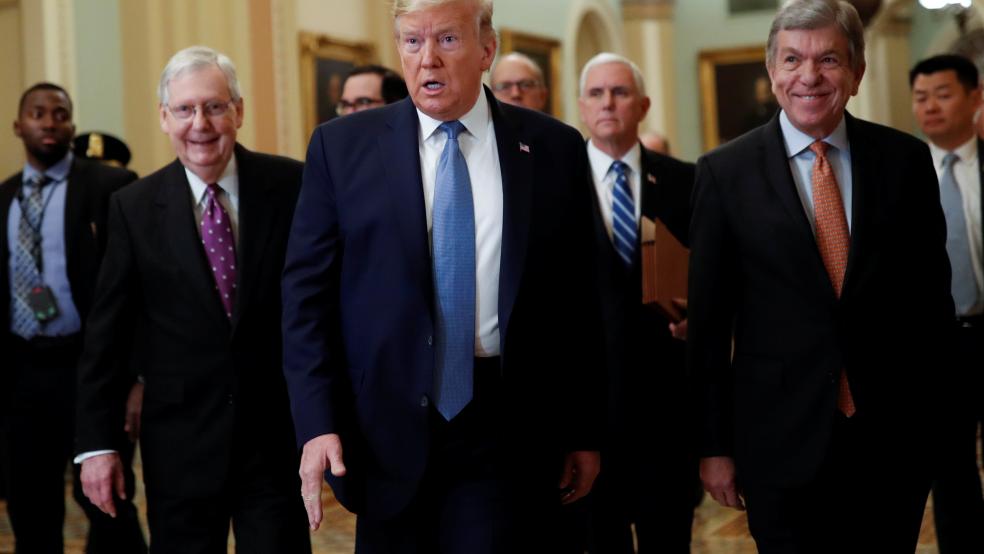President Trump promised Monday evening that his administration would quickly announce “very major,” very “substantial” and “dramatic” steps to boost the economy in the face of the coronavirus threat.
That might not be so easy. When Trump made his announcement, the administration and Congress had not settled on any such steps, and reactions from Congress suggest that there’s no quick consensus on a plan, though lawmakers prefer measures to help hourly workers and affected industries.
Trump wants a payroll tax cut: The measures under consideration by the administration reportedly center on a temporary payroll tax cut as well as paid leave for hourly workers, targeted tax breaks for industries hit by the outbreak and loans for affected small businesses.
Trump on Tuesday met with Republican senators at their weekly lunch and reportedly told them he wants a payroll tax holiday to run beyond the November election because he does not want the taxes to rise back to normal just before voters decide whether to give him another term. "I was just with the Republican senators and they were just about all there, mostly all there and there's a great feeling about doing a lot of the things," he told reporters afterward.
The payroll tax funds Social Security and Medicare. Employees and employers each pay 6.2% on the first $137,700 of wage and salary income for Social Security and 1.45% of their income for Medicare, plus an additional 0.9% surtax for married filers earning over $250,000.
The proposed tax cut could reportedly amount to $40 billion a month, though that could change depending on the size and duration of the cut.
But Tuesday’s Senate GOP meeting ended without any specific plan for an economic stimulus package or agreement on how to proceed. Democrats, meanwhile, are working on their own plan and reportedly could start rolling out elements of their package as soon as Wednesday.
Adding to the uncertainty, lawmakers are scheduled to leave town Friday until March 23, making it unlikely that any plan gets enacted over the next two weeks.
That timeline would require any legislative action be done with extraordinary speed, and House Speaker Nancy Pelosi indicated Monday that it might not be possible, prompting an angry response from Trump on Twitter. But Pelosi met Tuesday with Treasury Secretary Steven Mnuchin to discuss a relief package.
Hesitation on Capitol Hill: While Trump wants to “go big” on a fiscal stimulus package, lawmakers were questioning the wisdom of a payroll tax cut even before Tuesday’s GOP Senate meeting with the president and his economic team.
Reactions to the proposal on Capitol Hill suggest it could be difficult to reach a quick consensus about the next steps to take. Democrats have essentially dismissed the idea of a payroll tax cut and have outlined a different set of priorities for a stimulus package, including paid sick leave and extended unemployment insurance for people put out of work. “The administration seems to believe that the answer to any problem is another tax cut,” Senate Minority Leader Chuck Schumer said.
Members of the president’s own party — and some of his own aides — are reportedly cool to the idea as well, though they generally agree that a stimulus is needed.
At a meeting with Trump on Monday night, Treasury Secretary Steven Mnuchin, National Economic Council Director Larry Kudlow and Acting Director of the Office of Management and Budget Russ Vought argued that it is too early to enact such a cut, according to Politico.
Some Republicans on Capitol Hill have also expressed hesitation about a payroll tax cut.
- “Well, I usually love tax cuts, but I think it’s a little premature,” Sen. John Cornyn of Texas told Politico.
- Sen. Lindsey Graham of South Carolina questioned whether the cost of the cut would be more effective if applied to specific sectors of the economy.
- And Senate Majority Leader Mitch McConnell has reportedly made clear in private that he opposes the idea. “McConnell has made clear he ‘detests’ pursuing this particular policy, which would probably add to federal debt and deficits, and he has said many conservative GOP senators share his view,” The Washington Post reported.
Questioning the effectiveness of a payroll tax cut: Lawmakers and economists alike have expressed doubts about whether a payroll tax cut would do much to mitigate the economic fears and fallout stemming from the coronavirus outbreak.
“A payroll tax cut might be the correct response to an economic downturn, but it is far too broad to have a significant impact on the source of this potential crisis. It might help the stock market in the short run but it will be expensive,” Paul Winfree, the former deputy director of the Domestic Policy Council in the Trump White House told Politico. “Furthermore, it won’t help people who either can’t work because they’re home sick or are caring for someone who is sick. Nor will further incentives for people to work through supply-side policies to help contain the coronavirus epidemic.”
Some also worried that a payroll tax cut might incentivize virus-spreading behavior compared to other forms of stimulus. “We don’t want people having to choose between a paycheck and preventing the spread of the disease,” said Rep. Don Beyer (D-VA), vice chairman of the Joint Economic Committee, according to the Post.
Other possibilities for a coronavirus relief plan: Trump also said Tuesday that his administration would provide help to airlines and cruise lines, though he provided no details. And GOP senators variously suggested infrastructure spending and federal bailouts for the shale drilling industry hit by the sudden oil price war between Saudi Arabia and Russia. The administration is reportedly also looking at ways to enact a guarantee of paid sick leave without going through Congress.





